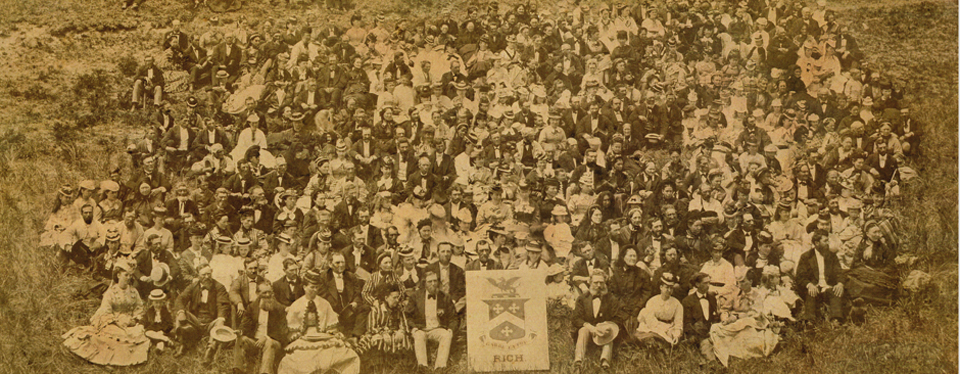RICH FAMILY Y-CHROMOSOME DNA STUDY
The Y-chromosome DNA tracks the paternal line of our genealogy. It can only be carried out with men, since women do not have the Y-chromosome. Mitochondrial DNA tracks the maternal line of genealogy and can be carried out with either men or women. Forensic DNA testing and paternity testing, which we hear so much about in the news and on TV, measure very different characteristics than either the mitochondrial or Y-chromosome tests. Application of this autosomal DNA which can be done with both men and women has the potential to help us learn more about our genealogy, but will require years of research.
There are a number of objectives which can be accomplished by a Y-chromosome DNA project.
1. Standard surname: Find connections among any men having a common surname.
2. Suspected surname connection: Prove that families with the same surname are related.
3. Surname elimination: Rule out families with the same surname as being related.
4. Name Change/Variation/Alias: Find proof of surname variations.
5. Rare surname: Prove that everyone with the same surname is related.
6. Uncertain paternity: Uncover connections hidden by adoption, illegitimacy, and other circumstances.
7. Famous roots: Discover if family tales of famous relatives are true.
8. Research verification: Put traditional genealogy to the test.
9. Crossing the pond: Discovering geographic origins in another continent or country.
The Rich Family Association initiated a program in the fall of 2004. These first tests were done with Oxford Ancestors in England. The relatively low-resolution 10 marker test was interesting but inconclusive as well as expensive.
For several years a 43 marker test by DNA Heritage was used and very helpful results were obtained for 90 Rich men. The largest number of these represented at least 15 distinct family lines with origins in Western Europe and Britain. Thirteen others were from other parts of Europe or the Middle East. In 2011 DNA Heritage closed down and our project was transferred over to Family Tree DNA (FTDNA). Some of our participants had already been tested by this company and all future work will be with FTDNA. The two companies did not test all of the same markers, but the FTDNA 37 marker test has enough markers in common with the DNA Heritage 43 markers to provide conclusive comparison. There are some other providers whose results have been integrated into the Rich project.
As you might expect there are a number of spelling variations which have been included in our project. Ritch, Reich, Riche, Reach as well as Rich have been found. My own apparent immigrant used Derich and we have also seen LaRich among our ancestors.
At the present time the fee for the 37 marker test with FTDNA is $149 when purchased though the Rich project. They occasionally run special sales for as little as $119. The Rich Family Association has established a special fund to finance testing where cost is an issue and results might be very useful. We have paid for a number of tests for Rich men living outside the US including South Africa and New Zealand. We hope to be able to induce English participants with this offer, but so far none have volunteered.
The test kit includes several plastic swabs which can scrape a few cells from inside the cheeks It is mailed back to the laboratory in Houston, TX and results are generally available in about three weeks. The results are sent by Email to me and to the participant. I have a master spreadsheet which allows me to compare the numbers to those previously entered and determine which family line they fit into. There are additional tests which FTDNA offers to confirm the ethnic origin or provide data on as many as 111 markers, but these do not appear to be all that useful at this time.
There are a number of Internet sites that can provide useful information on the testing, results from other projects as well as discussion topics which may be of interest. Family Tree DNA has a site at http://www.familytreedna.com. Most of our data has been posted on the World Families site at http://www.worldfamilies.net. This data does not identify the individual participants, but I will be able to add descent information in the future. A very large database with results for many different names is available at http://www.ysearch.org. More information can be found at http://www.smgf.org.
A number of excellent books have been written which explain the process. I can recommend Smolenyak, Megan Smolenyak and Turner, Ann, Trace Your Roots with DNA, Rodale, 2004. I have also read Pomery, Chris, DNA and Family History – How DNA Testing can Advance your Genealogical Research, Dundurn Press, 2004. I have not yet read Fitzpatrick, Colleen and Yeiser, Andrew, DNA and Genealogy, Rice Book Press, 2005.
By Richard D. Rich
